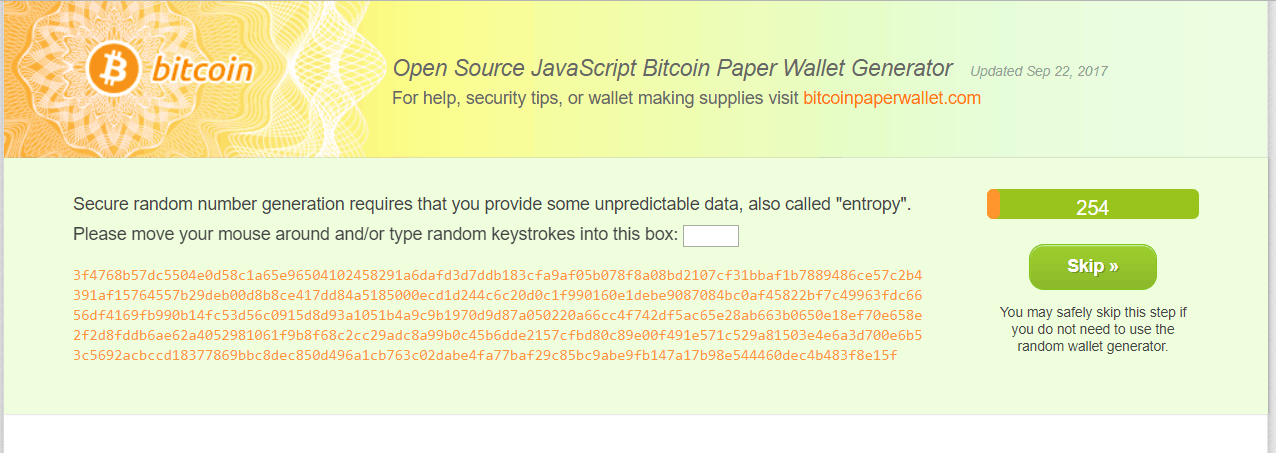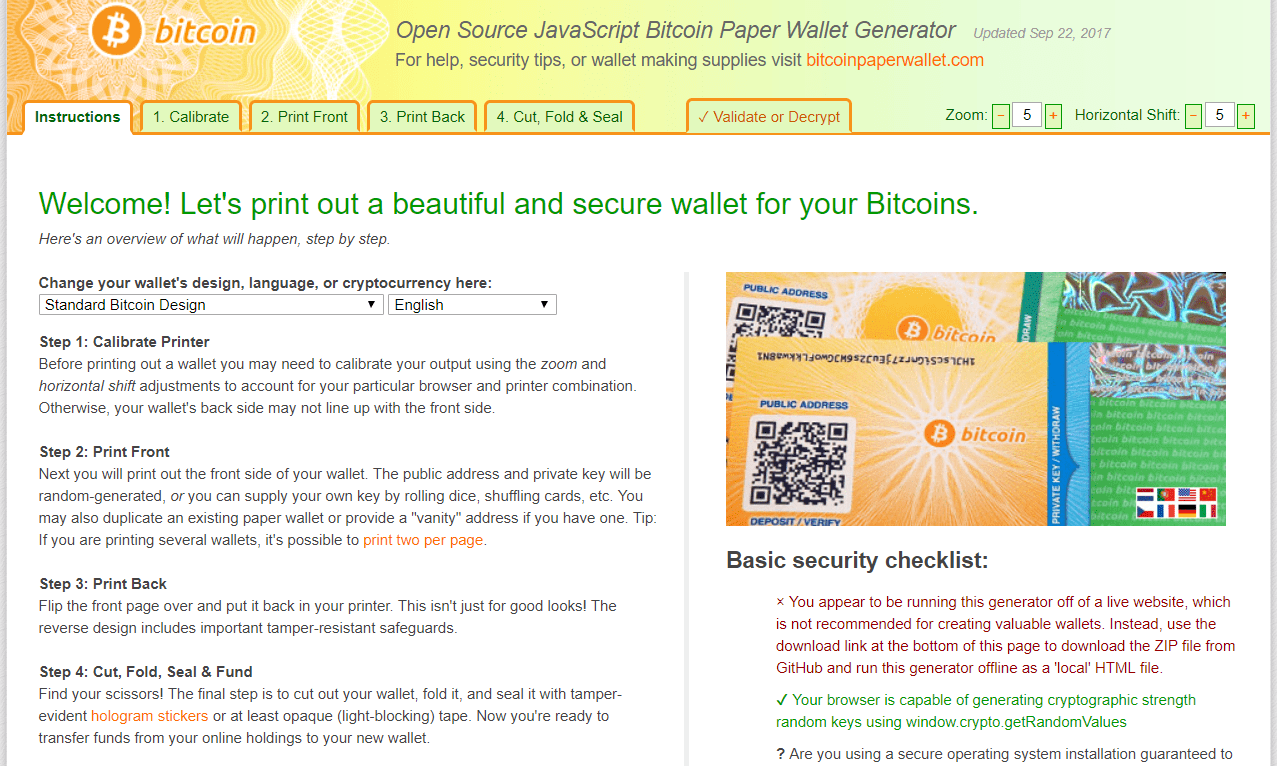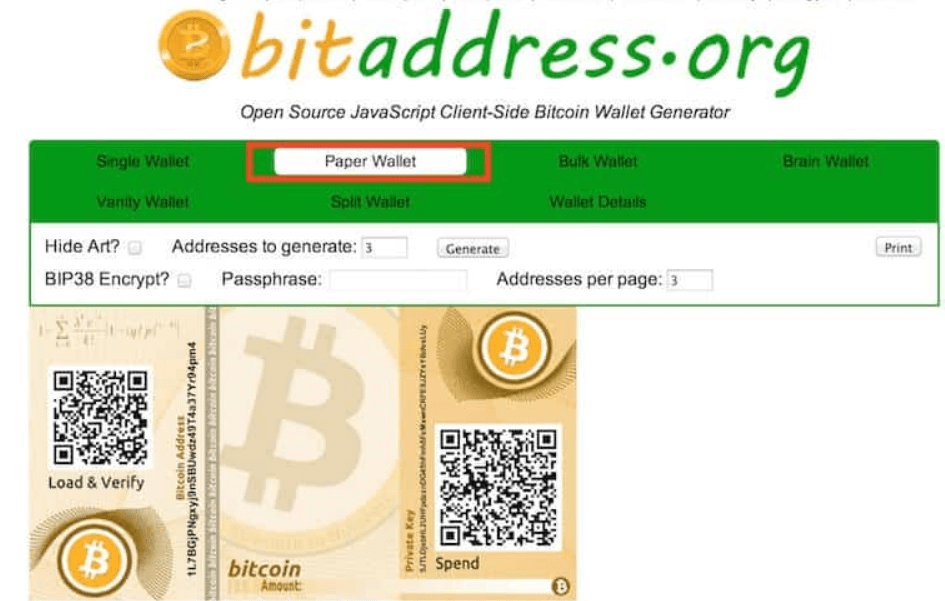
BEGINNER'S GUIDE TO CRYPTO WALLETS
LAST UPDATED MAY 31, 2018
As cryptocurrencies gain popularity, it’s important for all users to understand how to store, send, and receive cryptocurrency using tools known as wallets.
There are many cryptocurrency wallet options, each with their own benefits and drawbacks.
WHAT IS A CRYPTO WALLET?
Contrary to popular belief, a cryptocurrency wallet does not actually store cryptocurrency itself. Instead, a crypto wallet is any device, software, or web-based application that stores private keys to access cryptocurrency.
A crypto wallet is designed with two sets of keys (explained more later). One public key that is shareable and used to receive cryptocurrency to that wallet, and a private key, which provides access to send and spend cryptocurrency and should never be shared.
Some cryptocurrency wallets are able to store multiple types of coins and tokens, referred to as a multicryptocurrency wallet, while others specialize in storing just Bitcoin (and coins forked from Bitcoin like Bitcoin Cash) or just Ethereum (and related Ethereum tokens).
These specific wallets are sometimes referred to as Bitcoin wallets or Ethereum wallets. With the growth of altcoins most wallets today are multicryptocurrency wallets.
TYPES OF WALLETS
Aside from the type of coins that wallets store as mentioned above, wallets are generally divided into the following two broad categories: hot wallets and cold wallets, then further subdivided: Hot wallets (web, mobile, desktop); Cold wallets (hardware, paper, brain).
HOT WALLETS
A hot wallet is any wallet that is stored online, and therefore considered hot, as it’s always connected to the internet.
Hot wallets tend to be less secure than cold wallets because they run the risk of hackers or identity thieves attacking your local computer or the centralized server on which your wallet information is held.
On the flipside, using a hot wallet is the quickest and easiest way to spend and receive cryptocurrency in real-time, without having to constantly input your wallet information to an exchange or payment processor.
Web Wallets
There are two types of web wallets: exchanges and online wallet websites. Exchanges are sites where you can buy and trade crypto. They are like an online bank.
The upside to them is that you can buy crypto with them, not just store it; they’re easy and fast, and don’t require anything more than user login information to access.
One major downside is that they’re centralized and store your private keys, making your funds susceptible to hacks.
Alternatively, online wallet websites such as MyEtherWallet, allow users to interact with the blockchain to make transactions on the web without holding private key information, making them more secure.
However, many web wallets, especially those that are exchanges in addition to wallets, are notorious for being susceptible to security breaches and theft, as information is stored in a centralized location and never taken offline.
Recommended web wallets:
Coinbase (Read our review and user guide)
Coinsquare (Read our review and user guide)
Binance (Read our review and user guide)
MyEtherWallet
Mobile Wallets
A mobile wallet is only accessible through a mobile device, and is extremely helpful for viewing cryptocurrency balances, sending, and receiving funds on the go.
Mobile wallets also have an issue with security, as mobile devices are prone to hacking and theft.
Even losing a mobile device can result in loss of coins, which is why it’s always important to use added security features like two-factor authentication or biometric login for mobile wallets.
Recommended mobile wallets:
Jaxx (Read our Review and User Guide)
Exodus
Breadwallet
Desktop Wallets
Desktop wallets live on a single computer and can only be accessed through that singular device.
Desktop wallets still need to have internet connectivity in order to send and receive cryptocurrency, but tend to be safer than web alternatives since the wallet resides in software on your computer instead of on the internet and only connects to the internet when performing transactions.
However, since most computers are constantly connected to the internet and can be hacked there is still some risk with desktop wallets.
This is why it’s always important to use strong passwords, use virus and malware protection software, keep all software including the operating system up-to-date and avoid using public open WiFi whenever possible.
Recommended desktop wallets:
Jaxx (Read our Review and User Guide)
Electrum
Exodus
COLD WALLETS
Unlike a hot wallet, a cold wallet is stored offline and secured in a hardware device, piece of paper, or even by sheer human memory.
This makes cold wallets the most secure option for storing any cryptocurrency, but not the most efficient, as those using cold storage need to get their wallet information online before transacting (i.e. plugging hardware wallet to computer then going online or transferring wallet info to a hot wallet).
Hardware Wallets
With the increase in popularity of cryptocurrency, special hardware devices have been designed and created specifically for cryptocurrency storage and security.
They come in the form of small USB-like devices that are utilize hardware and software with high levels of security, typically requiring a password or phrase to access anything on the device itself.
In order to send cryptocurrency, users will have to connect their hardware device online. Though they are a secure option, hardware wallets are also the most expensive wallet option, costing upwards of $100 for a single wallet.
Paper Wallets
A paper wallet can be thought of as the less technologically-friendly cousin of the hardware wallet, as it provides a similar function and purpose, but without the technological advancements.
A paper wallet stores public and private key information on a piece of paper and nowhere else, leaving private information offline and in the control of the token holder.
This piece of paper is often stored in a safe or other secure location, and much like a hardware wallet, the keys have to be put online before being able to send cryptocurrency.
Brain Wallets
Contrary to popular belief, Bitcoin and other cryptocurrency are not actually stored in a wallet, only the public and private key information are stored (which gives the user access to the cryptocurrency).
Therefore, users have the option to memorize a complex passphrase, and personal or login information, giving no other person the ability to access cryptographic keys which is sometimes referred to as a ‘brain wallet’.
In theory this is the most secure way imaginable of storing cryptocurrency, however, there are clear pitfalls to this method. If the user forgets their key or dies, the cryptocurrency is lost forever, and cannot ever be recovered since it was never connected to any other wallet.
Users should be careful before deciding to store large quantities of cryptocurrency in their brain.
WHAT ARE CRYPTO WALLET KEYS?
Bitcoin and almost all cryptocurrencies take advantage of public key cryptography which is used in many different applications including secure email systems and a growing portion of the web (including this site).
Public key cryptography uses two ‘keys’, which are long strings of digits, one private key and one public key to uniquely identify an account and to digitally sign transactions so that they are secure.
Wallets store these key pairs for the user and let them use those keys to send and receive the cryptocurrency associated with them.
Private Key
Used as a digital signature for transactions in a way that makes it possible for anyone with the public key to verify the transaction even without access to the private key itself.
It provides proof that the user is the owner of the account and is required to be known for sending coins.
A private key should always be kept secret. Exposing it would allow whomever you have shared your private key with to appear as though they are the owner of the account and steal the coins by sending them to another wallet which they control.
Example of a private key for Bitcoin: L2nCYRCBbs6ZRs6h7wLHam4r85ihxAzhpNgpNJjqk7D5vrpuaWxc
Public Key
This key is your wallet’s unique identifier which is paired with the private key but can be shared with the public.
A public key can be derived from a private key, but a private key can never be derived from a public key. Which means that it is used to record all of the transaction information on the public blockchain.
Example of a public key: 128fhDzNNbGkzXuFL9sfGBYj9ethop4cAy
Address
Kind of like an email address, this is the unique identifier you give out to people to send you bitcoin.
The address is a hashed version of the public key for the account which means that it’s just an encoded version of the public key.
For Bitcoin specifically, it is recommended (although not necessary) to use a NEW address for each individual transaction which means that new public and private keys are also used.
Using a different address for each transaction is a way to make the transactions more secure and private. Most wallets create this new address and the associated keys automatically for the user.
Other coins such as Ethereum use the same address each transaction as there are other security and privacy mechanisms in place.
Example of a bitcoin address: 3J98t1WpEZ73CNmQviecrnyiWrnqRhWNLy
TIP: One of the best ways to secure a private key is to write down the key and store it in multiple, secure locations.
Possible storage locations include a bank safety deposit box, fireproof safe at home, encrypted USB device, or other. Having multiple locations for your private key will ensure you still have access to your key information just in case one copy happened to get damaged or lost.
Private Key
Public Key
Address
256 bits – 64 characters
256 bits – 34 characters
160 bits – 25-34 characters
A digital signature for all transactions
Mathematically derived from private key
Hashed from public key
Used to send bitcoin
Used to receive Bitcoin
Seed Recovery Phrases
An important security function of many Bitcoin wallets is the ability to restore information if a wallet is compromised for any reason due to theft, damage, or otherwise.
One way to restore wallet information is via the use of seed recovery phrases, which when entered correctly and in order, unlock wallet information (i.e. the keys).
Depending on the wallet or device being used, seed recovery phrases can range from 10-24 words that are given to users when first activating a wallet.
These phrases should be written down and stored in a secure location, away from the original wallet for added security.
In the event of a compromising event to the original wallet, the seed phrases can be pulled from their secure location and used to restore previous wallet information on another device.
HOW TO GET A BITCOIN WALLET
We recommend you eventually pick up a hardware wallet as they’re a secure option for storing lots of cryptocurrency, but if you’re just getting into crypto, a good wallet to check out first is Jaxx.
As a free desktop or mobile app it’s quick and easy when you first need somewhere to store your cryptocurrency.
You can download the wallet application from the Jaxx website.
Looking for step-by-step instructions on how to use a Jaxx wallet? Click here to visit our Jaxx User Guide and follow the steps to setting up the device and transferring coins.
HOW TO MAKE A BITCOIN PAPER WALLET
A Bitcoin paper wallet is a great option for keeping Bitcoin safe and secure at all times, as long as it’s created correctly.
What is a paper wallet?
A paper wallet is simply a sheet of paper (or any printable medium) with your private keys printed on it.
Because a paper wallet is generated one time and never stored online, its information is kept out of reach for hackers and malicious actors attempting to steal Bitcoin for unsuspecting users, making it a highly secure method of storing cryptocurrency (as long as you store them somewhere safe and as long as you create the wallet securely — see the 'Create a Secure Paper Wallet' section below).
The paper wallet serves a need for those not comfortable with the technological complexities of hardware or software wallets or for those who want the added security of having a backup wallet.
Create a Paper Wallet Online (Easy)
If you’re not so concerned about the security of your crypto or if you think a malicious attack or hack to your computer is unlikely, you can simply create a paper wallet online.
The first step to creating a paper wallet online is to navigate to a wallet generator such as the one here. Then, generate keys for your paper wallet by clicking the button on the homepage.

You will be taken to a screen that’s designed to generate random numbers.

Once your random keys have been generated you’ll be guided on the steps to print your Bitcoin wallet.
This may include calibrating your printer, changing the font on the wallet, and selecting the text for the back of the wallet.
After printing, you’re advised to seal your wallet to keep it safe from moisture.
It is also advised to keep the wallet in a fireproof safe to keep it free from damage or theft.

Create a Secure Paper Wallet
One of the primary security risks associated with paper wallet generation as above is if your computer or device has malware. If it broadcasts your screen to a remote location it would expose the private keys for the wallet.
One way to combat this would be to perform the similar steps as the previous paper generator, but running the wallet creation while not connected to the internet.
NOTE: If you're planning on dealing with large quantities of bitcoin OR are concerned that your computer/device is compromised, we recommended you perform the following steps on a clean device and a fresh operating system, which can be installed on a USB drive (such as using LiLi and Ubuntu).
Download the BitAddress Download file.
Disconnect from the Internet by unplugging the modem and/or disabling WiFi
Extract the zip file from #1 and open the ‘bitaddress.org.html’ file in Chrome, Firefox or Safari
Follow the instructions to generate the wallet by moving your mouse and/or typing random characters into the textbox
Select the “paper wallet” option and print out the wallet(s)
Restart your computer before going back online

Dangers of a Paper Wallet
As previously mentioned, while the use of paper wallets might seem like a secure way to store Bitcoin, it has its own security pitfalls if not done correctly.
Generally, we would recommend the use of a paper wallet for more advanced users interested in long term storage of Bitcoin.
Using a paper wallet for sending and receiving coins can involve some complications depending on the nature of the transaction.
If you're planning to use a paper wallet we would recommend reading this post first about spending bitcoin with a paper wallet.
Creating a secure paper wallet on a new operating system, offline, and using local files, will combat many of the problems associated with paper wallets. These security dangers include:
Loss or theft of the paper wallet
Creation of a non-secure wallet on a compromised device
Compromised wallet information from the site the wallet was generated
Accidental damage or destruction of the paper wallet
CHOOSING THE RIGHT BITCOIN WALLET
The best Bitcoin wallet for one use can be the worst for another. Assess your needs before deciding what wallet to get (or use different wallets for different applications).
Each wallet type has benefits and drawbacks, and it’s not uncommon for Bitcoin holders to use multiple types of wallets to meet all of their needs, from secure storage to on-the-go spending and everything in between.
Best Wallet for Spending Bitcoin – Mobile Wallet (Jaxx)
By far the best, and easiest way to use Bitcoin is via a mobile wallet. Mobile wallets give the flexibility and functionality to use on the go, whether that be paying for a cup of coffee or tank of gas.
If the future brings regular, everyday Bitcoin purchases, mobile wallets will be the wallet of choice to replace credit cards and cash.
Jaxx not only allows for on-the-go spending and storage of Bitcoin, its built-in exchange functionality allows users to exchange their Bitcoin for other cryptocurrencies all in one function, making it the best choice for a mobile wallet application.
Best Wallet for Trading Bitcoin – Web Wallet (Coinbase)
Most major web wallets (Binance, Coinbase, etc.) are also attached to exchanges that allow for easy and fast trading between Bitcoin and other crypto and fiat currencies.
This makes going from Bitcoin to any major currency fast and easy.
Just remember to keep in mind the exchange fees associated with any Bitcoin trade.
Coinbase is the best web wallet that allows for easy exchanges and trading, while also allowing quick sending and receiving of cryptocurrency to and from outside wallets.
Best Wallet for Storing Bitcoin – Cold Wallet (Ledger Nano S)
Storing Bitcoin that will not be used for a significant period of time should always be kept in a cold storage wallet.
Ensuring that the Bitcoin are kept as far away from internet access as possible will help protect against theft and malicious attacks.
The Ledger Nano S hardware wallet* is the best-in-class option for security and storage of Bitcoin, with high levels of data encryption and password protection.
BEST CRYPTOCURRENCY WALLETS
Wallet Type
Wallet
Best For
Worst For
Recommended
Hot
Web
Trading
Security
Coinbase
Mobile
On-the-go
Security
Jaxx
Desktop
Control
Security
Jaxx
Cold
Hardware
Security
Cost
Ledger Nano S *
Paper
Security
Quick Trading
Bitaddress
Brain
Portability
Longevity
Bitaddress
* This link directs you to Amazon as it provides the most options for purchasing this wallet. However, it is important to note that when purchasing a hardware wallet through a third party retailer or vendor to always ensure that the wallet once received has not been tampered with as this could compromise its security and thus the cryptocurrency you will store on it. Each wallet manufacturer typically has tamper resistant packaging or other hardware/software mechanisms to prevent tampering but they are not foolproof. Please only purchase hardware wallets from trusted vendors.
Read the full article
